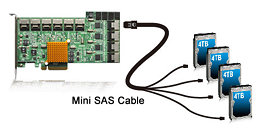- Joined
- Oct 9, 2007
- Messages
- 47,775 (7.41/day)
- Location
- Dublin, Ireland
| System Name | RBMK-1000 |
|---|---|
| Processor | AMD Ryzen 7 5700G |
| Motherboard | Gigabyte B550 AORUS Elite V2 |
| Cooling | DeepCool Gammax L240 V2 |
| Memory | 2x 16GB DDR4-3200 |
| Video Card(s) | Galax RTX 4070 Ti EX |
| Storage | Samsung 990 1TB |
| Display(s) | BenQ 1440p 60 Hz 27-inch |
| Case | Corsair Carbide 100R |
| Audio Device(s) | ASUS SupremeFX S1220A |
| Power Supply | Cooler Master MWE Gold 650W |
| Mouse | ASUS ROG Strix Impact |
| Keyboard | Gamdias Hermes E2 |
| Software | Windows 11 Pro |
HighPoint Technologies, Inc., a leading HBA and storage solutions manufacturer, announces the industry's first 40-Port SATA 6 Gb/s HBA - the Rocket 750. HighPoint is proud to introduce our innovative SATA Aggregation Technology to the storage marketplace - this revolutionary architecture allows a single host adapter card to support up to 40 SATA hard drives, and represents the industry's lowest-cost mass SATA storage solution.
The Rocket 750 is ideal for applications that require huge levels of storage capacity such as data Libraries, archiving and backup solutions, but need to maximize cost savings over SAS expander-based configurations. Powered by a PCIe 2.0 x8 host interface, 40 device channels, and HighPoint's Intelligent Storage Health Management Suite, the Rocket 750 is an ideal DAS solution for PC platforms and SMB server applications.

The Rocket 750's revolutionary HBA architecture removes the need for costly SAS expander devices and chassis backplane hardware, dramatically reducing up-front costs. The PCIe 2.0 x8 host interface and 6 Gb/s SATA controller hardware deliver the ideal transfer bandwidth for applications focused on maximizing available storage capacity.
Each device port supports up to four SATA hard drives: A single Rocket 750 is capable of supporting up to 40 4TB 6Gb/s SATA disks, for an unprecedented 160TB of directed-attached storage. The industry-standard SFF-8087 Mini-SAS connectors streamline installation, upgrade and maintenance procedures and ensure maximum compatibility with industry standard storage cabling, accessories & chassis hardware.
HighPoint has long recognized the value of unified management services. While other affordable mass storage solutions make do with the operating system's default utilities, or the disk manufacturer storage related monitoring software, Rocket 750 HBA's include HighPoint's comprehensive management suite known as Intelligent Storage Health Manager (ISHM). This intuitive web-based interface is available for all major PC operating system platforms, and includes a wide selection of storage related monitoring and notification services.
ISHM allows administrators to instantly check the status of all hosted storage devices, including available capacity, the condition of individual drives, and the health of the Rocket 750 HBA. The built-in SMART monitoring service provides real time data for each individual SATA hard drive, and actively records all warnings errors, and hardware related failures associated with each device to the central Event Log.
ISHM allows administrators to login remotely via an internet connection or local network, and configure Email notification and alert services to keep abreast of changing storage conditions while in the field.
HighPoint has developed a series of software suites that allow professional solution providers to quickly and easily integrate the Rocket 750 into all major PC operating system platforms including Windows 2012, 2008, 2007, and 8, Linux Distributions, and FreeBSD.
The Rocket 750 will be available in April 2013 from our worldwide network of retail and distribution partners.
MSRP: USD$ 739.00.
View at TechPowerUp Main Site
The Rocket 750 is ideal for applications that require huge levels of storage capacity such as data Libraries, archiving and backup solutions, but need to maximize cost savings over SAS expander-based configurations. Powered by a PCIe 2.0 x8 host interface, 40 device channels, and HighPoint's Intelligent Storage Health Management Suite, the Rocket 750 is an ideal DAS solution for PC platforms and SMB server applications.

The Rocket 750's revolutionary HBA architecture removes the need for costly SAS expander devices and chassis backplane hardware, dramatically reducing up-front costs. The PCIe 2.0 x8 host interface and 6 Gb/s SATA controller hardware deliver the ideal transfer bandwidth for applications focused on maximizing available storage capacity.
Each device port supports up to four SATA hard drives: A single Rocket 750 is capable of supporting up to 40 4TB 6Gb/s SATA disks, for an unprecedented 160TB of directed-attached storage. The industry-standard SFF-8087 Mini-SAS connectors streamline installation, upgrade and maintenance procedures and ensure maximum compatibility with industry standard storage cabling, accessories & chassis hardware.
HighPoint has long recognized the value of unified management services. While other affordable mass storage solutions make do with the operating system's default utilities, or the disk manufacturer storage related monitoring software, Rocket 750 HBA's include HighPoint's comprehensive management suite known as Intelligent Storage Health Manager (ISHM). This intuitive web-based interface is available for all major PC operating system platforms, and includes a wide selection of storage related monitoring and notification services.
ISHM allows administrators to instantly check the status of all hosted storage devices, including available capacity, the condition of individual drives, and the health of the Rocket 750 HBA. The built-in SMART monitoring service provides real time data for each individual SATA hard drive, and actively records all warnings errors, and hardware related failures associated with each device to the central Event Log.
ISHM allows administrators to login remotely via an internet connection or local network, and configure Email notification and alert services to keep abreast of changing storage conditions while in the field.
HighPoint has developed a series of software suites that allow professional solution providers to quickly and easily integrate the Rocket 750 into all major PC operating system platforms including Windows 2012, 2008, 2007, and 8, Linux Distributions, and FreeBSD.
The Rocket 750 will be available in April 2013 from our worldwide network of retail and distribution partners.
MSRP: USD$ 739.00.
View at TechPowerUp Main Site


 .
.

